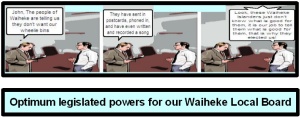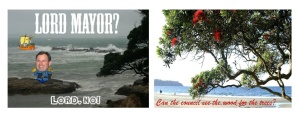[ Note 29/6/18 : links below & in right-hand column may now be defunct; but gist of content overview remains : ]
Updated February 15 2010 :
Refer to our new website www.waihekecommunityplanning.org.nz
Updated July 22 2009 :
WICPG Further Submission to Local Government ( Auckland Council ) Bill 2 – july 21 : pdf : Schavan on SD : pdf :
WICPG Submission to Local Government ( Auckland Council ) Bill 2 – june 26 : pdf : doc :
Waiheke Community Board Recommendations re Local Government ( Auckland Council ) Bill 2 : pdf : doc :
Appendix 1 to above WCB Recommendations – Draft Delegations Schedule : pdf :
WICPG Submission Template and Appendix 1 merged : pdf :
Updated June 18 2009 :
.
WICPG SUBMISSION TEMPLATE – Post 2 copies or email, by Friday June 26 : doc : pdf : Anticipated Timeline here
Clerk of the Committee, Auckland Governance Legislation, Local Government and Environment Select Committee Office, Parliament House, Wellington :
Phone : 04 817 6975 : email : AGL@parliament.govt.nz
Re Local Government ( Auckland Council ) Bill – Auckland Governance Legislation Bill 2
[ name ] …… ………………………………………………………………………………………..
[ address ] …………………………………………………………………………………………..
Contacts [ telephones / e-mail]……………………………………………………………………………….
Background :
The Hauraki Gulf Maritime Park Board was established in 1968. In 1989 the then Waiheke County Council was amalgamated into the ACC. In 2008 the Waiheke Island & Hauraki Gulf community members contributed 28% of the 3500 submissions to the Royal Commission on Auckland Governance, and were heard by the Commission at the Conference Centre in Claris Great Barrier on Friday June 27, and on Waiheke at an all day hearing held on Piritahi Marae on Thursday July 10 2008. The Waiheke community especially supported the ARC Option 5 “The One and the Many” proposal for a 2-tier system of governance. Under this option all assets would be owned in common by one organisation, and local communities would be granted more devolved powers to build on local strengths and to respond to local priorities. Subsequently the Royal Commission ( which reported on March 27 2009 ) found in favour of Waiheke and Great Barrier being granted wider delegated powers than they currently receive, in recognition of their unique character which was not well recognised or understood by the ACC. The report went on to recognise the special nature of the Hauraki Gulf which has its own legislation, the Hauraki Gulf Marine Park Act 2000. Subsequently the government introduced the herein referred to Bill on May 13 2009, as the second of a three Bill Auckland Governance Legislation programme.
Submission:
I / we oppose this Bill as detailed below
Sect 5 & Sect 7 – Meaning of Auckland & Auckland Council established – Constitute a separate local governance entity for the Hauraki Gulf and its islands seeking international recognition for its integrated approach to sustainability, as our special iconic geography and conservation history and community demographic together skew our community towards a more collaborative and sustainability governance ideal, which in turn makes us culturally incompatible with isthmus anti-sustainability and anti-community priorities. ( e.g wheelie bins and HGIPP outcomes, and ACC’s command and control governance practices ).
Sect 8 – Governing body of Auckland Council – and election of members – I / we support a full ward system with no members to be elected at-large, as opposed to having 8 at-large and 12 ward members.
Sect 9 – Mayor of Auckland – I / we oppose the mayor being able to appoint committee chairs.
Sect 10 – Local Boards – establish a separate local governance entity for peri-urban Waiheke Island and another for Great Barrier Island, which reconciles with Sect 5 & 7 comments above.
Sect 13 – Functions, duties, and powers of local boards – I / we support optimum legislated delegated powers for Waiheke and the Hauraki Gulf which reconcile with Sect 5 & 7 & 10 comments above..
Signed: ……………………………………….. Dated : …………………………………………………
Submission Template prepared by Waiheke Island Community Planning Group Inc ( WICPG ) – 09 372 9541
__________________
Updated June 18 2009 :
COLIN BEARDON SUBMISSION IDEA : here
This submission has a focus upon a more international management perspective ideal for our Hauraki Gulf.
WICPG endorses this worldview.
__________________
Updated april 24 2008
WICPG RCoAG SUBMISSION : here
WCB RCoAG SUBMISSION as reported in the Gulf News april 24 : here
__________________
.
Updated June 25 2008
.
SPEAKING NOTES FOR CHAIRMAN MIKE LEE
Presentation at Royal Commission of Inquiry
Wednesday 25 June 2008, 9.30am
Introduction
-
Good morning and thank you for the opportunity to present our submission to you.
-
On behalf of the Auckland Regional Council can I express my appreciation at the rigorous and diligent way the Royal Commission has been undertaking this inquiry. We understand you have received nearly 4000 written submissions and have heard or will be hearing from some 600 individuals.
-
This is a critical time for Auckland and for the ARC. The ARC has been very much focussed on major projects for the region, including the electrification of the rail network and the major urban renewal project for the Wynyard waterfront – and now the need to respond to the Royal Commission.
-
As the only organisation with the statutory responsibility to promote the well-being of the people of the whole Auckland region, the ARC considers that it has a particular responsibility and even a moral duty to support the work of the Royal Commission.
-
You have been given a task of immense importance for Auckland and for New Zealand, as local government has a profound effect on the everyday lives of residents and ratepayers.
-
Determining the system of local government that will best suit Auckland for the next 20 to 100 years is of considerable importance to Auckland, and to New Zealand.
Process of developing our submission
-
The ARC developed its submission through a series of Councillor workshops, in which all Councillors and numerous members of staff took part.
-
We considered all matters in the terms of reference, considered the objectives and tried as much as possible to take an objective and principles based approach to developing our submission. To step outside ourselves as it were.
-
We were soon faced with a paradox, a dilemma: How to achieve the regional cohesion and unity that many Aucklanders have been calling for, for over 50 years but also at the same time how to retain and indeed restore genuine local government and local democracy to local communities.
-
We built from a definition of the problem and consideration of future challenges facing the region.
-
We considered what functions are most appropriately delivered at what level (form should follow function).
-
We objectively studied and critiqued a number of options, arriving at the recommended option through a process of elimination.
What we concluded
-
First of all we concluded that we (the ARC) are a part of the problem. There is widespread public dissatisfaction and even frustration with local government in Auckland – that is why, after all, there is a Royal Commission here in the first place. Therefore we feel we have to get out of the road to allow something new and better to be built in its place – to take Auckland into the future
-
We are calling for the ARC and the other seven TLAs to be abolished, to be replaced by a single unitary authority, the Greater Auckland Authority, with a number approximately 30 constituent Community Councils.
-
Our proposal is a radical but essential cure for the persistent Auckland ‘disease; of fractiousness, disunity and cost duplication.
-
Auckland has outgrown numerically, economically and socially the present three-tier, eight council governance model. It’s time for something much more efficient and cost-effective (indeed more democratic) and this is what the ARC is proposing – a single unitary authority – the Greater Auckland Authority.
Our recommended option
-
You have read our submission, and the additional material, so you will be familiar with our recommended option – so we won’t spend time labouring on this
-
Essentially what we propose is two tiers of local governance in the one body, it relies on one integrated administration to support and to implement decisions.
-
Predicated on this is a clear and transparent division of labour and political accountability between the regional and the local level. In other words checks and balances.
-
All assets would be owned in common by the one organisation: local communities would be responsible for local assets, and the responsibility for city-region assets would be vested with the Greater Auckland Authority.
-
The Greater Auckland Authority would be better placed to deliver major projects and regional priorities, to achieve better critical mass, and provide timely responses to important issues for Aucklanders.
-
Community Councils will provide local communities with the ability to build on local strengths, respond to local priorities and challenges, understand and respond to local diversity and help revitalise communities some of which give every indication of being in social decline. Their elected members would have much greater responsibilities – they would be called ‘councillors’.
-
In terms of territoriality, our submission we also proposed that the boundary of the region remain the same in the north and that the southern boundary be extended to join the Waikato River.
-
Under this arrangement, all Franklin district territory north of the Waikato River would join the Auckland region. All Franklin district territory south of the Waikato River would be amalgamated with Waikato district and become part of the Waikato region.
-
As we have already submitted a detailed proposal and supplementary information – we will not belabour you with another restatement of the details of our proposal – as I mentioned earlier the Commission has already heard from 100s of Aucklanders – so we will not take up more of your time. We are however fully prepared to answer questions on our proposal.
Questions
-
We’d now like to focus on taking any questions you may have on our submission, or on any of the additional supplementary material provided.
-
We will do our best to answer your questions and if we can’t, we are happy to come back with more detailed material/responses.
-
Thank you again for the opportunity to discuss this with you.
.
Updated April 23 :
.
ROYAL COMMISSION SUBMISSIONS RECEIVED – here
.
Updated April 17
‘The One and the Many’: Auckland Regional Council Votes for Greater Auckland Authority :
.
The Auckland Regional Council today voted to recommend a single unitary authority to the Royal Commission considering how Auckland might best be governed comprising a Greater Auckland Authority and a number of local community councils.
.
Updated April 16 :
ARC Extraordinary Meeting April 17 : Agenda Item :
Draft Submission to the Royal Commission of Inquiry
ARC Draft Submission documents here : Full Agenda documents here
.
RECOMMENDATIONS
a) That the report be received.
b) That the ARC’s submission recommend option five to the Royal Commission of Inquiry as the best option to improve governance and address the present and future challenges the region faces.
c) That Council adopt the attached draft submission as its submission to the Royal Commission on Auckland Governance, subject to minor editorial and typographic changes.
d) That Council delegate responsibility to approve and submit the submission to the Chair and Deputy Chair of Council.
e) That the Council recognise the efforts of staff in preparing the draft submission.
.
OPTION FIVE :
Option five is the recommended option and consists of a single unitary authority, the Greater Auckland Authority, supported by a number of ‘Community Councils’.
.
To ensure local democracy, Community Councils would be established in legislation and have a prescribed set of specific responsibilities and activities. This is a two-tier model of local government, but both tiers are part of one, integrated whole.
.
Characterised as “the One and the Many” Option five is designed to deliver a clear and transparent division of labour and political accountability between the regional and the local level. It is designed to foster dynamic local democracy within a cohesive approach to the whole city-region. Whilst it provides for two tiers of local governance, it relies on one integrated administration to support them and implement their decisions. Whilst it provides that all assets are owned by the one organisation, it also provides for responsibility for local community assets to be local and responsibility for city/region assets to be vested with the Greater Auckland Authority.
Option five provides a simple governance model that is easy for communities to understand and interact with, and gains cost-efficiencies. It provides an enabling framework for the Greater Auckland Authority to deliver on major projects and regional priorities, and provide timely responses to key issues for Aucklanders.
.
Community Councils will provide local communities with the ability to build on local strengths, respond to local priorities and challenges, and understand and respond to local diversity.
.
This model consists of a single unitary authority, the Greater Auckland Authority, supported by a number of Community Councils. The Greater Auckland Authority would combine many of the responsibilities of present TAs and the ARC, including integrated three waters management, arterial roads, economic development, waste management, building and environmental health regulation, and would manage regional assets.
Community councils would have specific local responsibilities defined in statute including responsibility for local roads and local road priorities, local community facilities, local parks and reserves, local urban renewal and improvement programmes, community development, community safety and environmental enhancement programmes.
.
Option five is the recommended option for a number of reasons:
• It allows for strong regional policies, initiatives and responses, made by an agency with the funding, capability and mandate to implement them efficiently and effectively. It reduces the dependence on joint decision-making, thereby facilitating timely decision-making and enabling regional government to deliver
on projects of significance for the region.
• It provides for cost-effective management of assets and cost-effective delivery of services by placing responsibility for most of these in the hands of one regional agency that is able to achieve economies of scale. These potential savings have been estimated to be in the order of $160m per annum.
• It fosters local democracy, as Community Councils would be of a scale to facilitate local initiatives, deal with local issues, and make positive change at the local level. Community Councils allow decisions to be made at an appropriate level, close to those who are affected.
• The Greater Auckland Authority provides central government and other parties such as iwi with a clear regional partner and provides one clearly identifiable agency that is able to represent the interests of the region.
• It has the necessary ingredients to deliver on the region’s economic development potential by building a regional agency with the capability to plan and fund infrastructure development, undertake urban renewal projects, undertake regional planning, undertake regional promotion and major events
management, and support businesses and investors.
• It provides for effective responses to the increasing complex challenges facing local government (such as climate change), by building a strong regional agency that can determine strategic approaches and has the capability to respond. It would also facilitate effective community-level responses through the work of Community Councils.
• It provides more effective responses to diverse communities of interest than the status quo by creating Community Councils that are more locally focused, with less potential for some communities to be overlooked.
• It is likely to facilitate greater participation because it allows communities to be involved in local Community Councils as well as vote in an election for an authority which can deal with the real regional issues which are compelling to voters.
.
Updated April 10 :
POSTCARDS FROM WAIHEKE :
We have a rich, colourful, diverse and vibrant community and the Royal Commission needs to know that we are engaged. Postcards as well as the Template Shortforms can help here. Postcards & Templates will be available at the Ostend Market on Saturday morning, and from Artworks on Saturday afternoon next, 1.30 – 4.00 p.m.
Updated April 4 :
WORKSHOP AT ARTWORKS, ONEROA THIS SATURDAY APRIL 5 2008 @ 2pm
” A once in a lifetime opportunity ” Mike Lee – to have your say on this island’s local governance. See Issues & Options here.
Updated April 3
PUBLIC MEETING MEDIA REPORT FROM GULF NEWS :
Andrea Glazier reports back from last Saturday’s public meeting into local democracy where she witnessed a unified voice calling for Waiheke to break away from Auckland City Council.
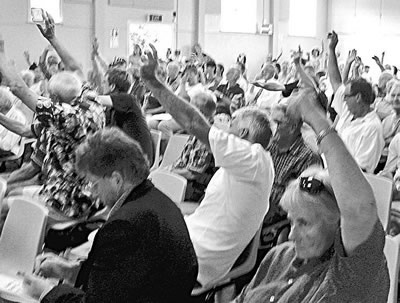
A show of hands says it all – photo courtesy of Gulf News
Islanders are being urged to have their say on Auckland Governance, as the Royal Commission’s 22 April submission deadline draws nearer. Ostend Memorial Hall was packed by 2pm. Around 150 islanders had forsaken their usual Saturday afternoon activities in favour of devoting two hours to hearing, among others, chairman Mike Lee from the ARC speak on how best to make their views heard on how Auckland is presently governed. More from the Gulf News here
Updated April 2
NEWS UPDATE : HAURAKI GULF FORUM NEWSLETTER 1
This is the first issue of what will be a quarterly newsletter highlighting important activities being carried out by agencies and community groups around the region. The visual identity we have chosen, based on the weave of a kete, represents the Hauraki Gulf Forum’s role of bringing together the organisations, cultures, catchments and issues of Tikapa Moana, the Hauraki Gulf.
![]()
newsletter link here
Updated March 2o
NEWS UPDATE : PUBLIC MEETING NOTICE :
SWALLOWED UP or MORE LOCAL DECISION-MAKING :
Mike Lee ( Waiheke resident and ARC Chairman ), and Sandra Lee (ex Minister for Local Government ) secured to address our March 29 Public Meeting @ Ostend Hall 2.00 p.m.
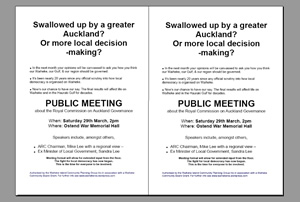
enlarge here
Updated March 11
NEWS UPDATE : PRESS RELEASE :
Public Meeting and Workshops for the Royal Commission of Inquiry on Auckland Governance
Waiheke Islanders who care about local democracy are being urged to put in a submission to the Royal Commission on Auckland Governance and a public meeting and workshops will be held over the next six weeks to help people get them in.
The public meeting will be held at the Ostend Hall on Saturday 29th March from 2pm – 4pm and four-hour workshops are scheduled for Saturday 5th April and Saturday 12th April at 1pm at Artworks theatre.
Councillor Denise Roche says the community board funding that was allocated to the Waiheke Island Community Planning Group Inc is to help people use the Royal Commission process to have their say.
“ Since amalgamation with Auckland City in 1989 we haven’t had an opportunity to critique how the system has worked for our community, and clearly a lot of us have very strong opinions on that.” she says. “With the commission we can all give examples of what has and hasn’t worked for us as well as putting forward our ideas on how the wider Auckland region can be more effectively governed.
Cr Roche says that Waiheke is one of only two wards in Auckland that is actively promoting participation in the Royal Commission process.
“ Eden/Albert is the only other community board in Auckland City that is publicly promoting the Commission. We’re very fortunate with the planning group to have committed people who are willing to take the lead in driving up the issue,” she says. “It’s a tight time frame but I am confident that the workshops and meetings will result in a number of good high quality considered submissions.”
Submissions need to reach the Commission by 4pm on April 22nd. Information packs and standard submission forms are available from the local library and service centre and the Waiheke Island Community Planning Group have set up a blogsite at http://www.waihekercs.wordpress.com
“It’s about democracy,” says Councillor Roche.
ENDS
Contact : Denise Roche, Councillor Hauraki Gulf Islands ; Ph: (09) 372 6578 or 027 2097554 ; Email: Cr.Roche@aucklandcity.govt.nz
TIMELINE : March 9 2008 : pdf here
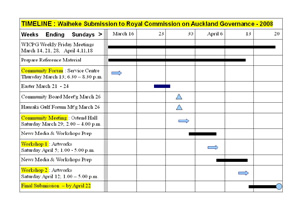
NEWS UPDATE : March 6 :
With so much info to take in it is hard to know where to start.
However we believe that the critical start point is the below Outline of Issues paper , ( get your hard copy from the library as Parts One & Two of the Call for Submissions booklet. ), and of how we on Waiheke fit in to the scheme of such things, especially with our more eco-focused local community values as an island community in the Gulf and Hauraki Gulf Marine Park.
Feb 26 :
WAIHEKE SUBMISSIONS to the ROYAL COMMISSION on AUCKLAND GOVERNANCE:
hello all,
This blog is intended to be used as a community feedback forum for all our thoughts and ideas.
This blog has also been set up so that you / others may easily contribute rather than simply comment on another’s postings.
So to receive username / password login access to enable you to make postings simply email wicpg@hotmail.com, or text 027 472 2295.
With respect to input from everybody, it is crucial that this facility is used responsibly and positively. Goodluck.
THE ROYAL COMMISSION :
- The Royal Commission website can be found here
- Questions & Answers here
- The Commissioners here
- Terms of Reference here
- Media Release Jan 23 2008 here
- Call for Submissions here
- Outline of Issues here
- Making a Submission here
This input is a community service from WICPG Inc ( Waiheke Island Community Planning Group Inc )

